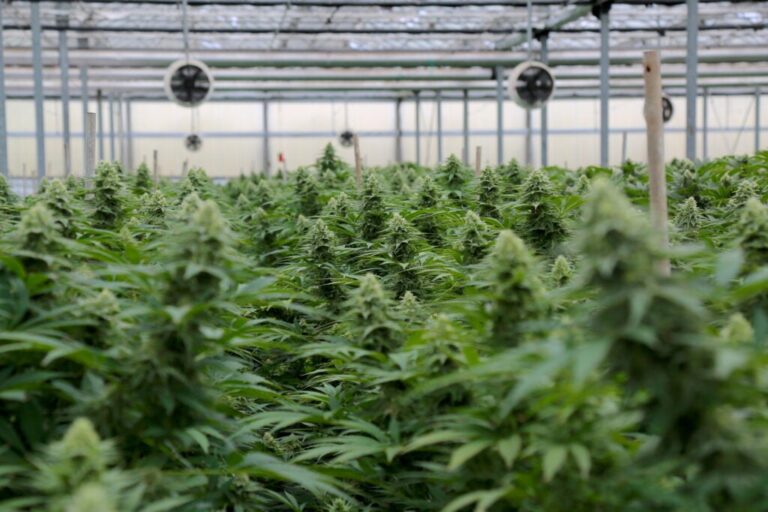As consumers embrace pesticide-free foods for their health and taste benefits, Autumn Brands is bringing similar clean practices to cannabis. A woman-owned, family-run company based in Santa Barbara, California, is setting a new standard for sustainable, pesticide-free cultivation.
Co-founded by Chief Financial Officer and Partner Autumn Shelton along with the brand family Hans, Johnny and Hannah Brands, Autumn Brands is known for its commitment to health, wellness and environmental responsibility.
In an exclusive interview with Benzinga Cannabis, Shelton talks about his journey from traditional farming to cannabis and the challenges of growing it without pesticides.
Get Benzinga's exclusive analysis and top cannabis industry and market news delivered to your inbox every day, free of charge. Subscribe to our newsletter here. If you're serious about your business, you can't afford to miss it.
From daisies to dank: Autumn's brand heyday
Autumn Brands started as a cut flower business growing Gerber daisies, but as competition from South America increased, the team realized they needed to pivot. “My partner Hans had owned this property for over 30 years, and the cut flower industry was struggling,” Shelton said. “We saw the legalization of cannabis as an opportunity to transition, so we switched our business from cut flowers to cannabis.”
But it wasn't just a matter of switching crops.
Provided by Autumn Brand
Shelton and her team took it a step further by deciding to grow cannabis without any pesticides, organic or otherwise. “Hans came to me in 2017 and said, 'I want to stop spraying pesticides.' And I said, 'I like this idea, but how do we make it happen?' '' she told Benzinga.
After some research and a significant investment in beneficial insects, the team made the transition. “We threw away tens of thousands of plants until the ladybugs took up residence in our greenhouse. We have been 100% pesticide-free ever since,” she said.
Related article: Federal health agencies need stronger role in shifting U.S. cannabis policy, new report says
Pesticide-free cannabis: a niche market poised to grow
Shelton said the pesticide-free cannabis market will only grow as consumers become more knowledgeable about what's in their products.
“Before legalization, people didn't realize they were smoking cannabis with pesticides, but now they're starting to understand the importance of clean cannabis,” she says. “Recent recalls related to pesticide contamination have increased awareness and led to a desire for more pesticide-free products.”
However, expanding pesticide-free cultivation remains a challenge. “It’s more of a craftsmanship,” Shelton said. “We needed to create a perfect ecosystem within the greenhouse where beneficial insects could thrive, but it's not easy to recreate that on a large scale. So we still have to adjust our standards. We are looking for a partner who meets our needs.”
Provided by Autumn Brand
Expanding sustainability
“The most difficult part was learning how to fight pests like mites without using chemicals,” Shelton said. “We had to find new ways to manage the product without compromising its quality.”
Despite these challenges, Shelton emphasized the long-term benefits of going pesticide-free. “We save money by not having to worry about recalls or heavy metal contamination. It also creates a perfect ecosystem for beneficial insects to thrive in the greenhouse, eliminating the need for regular pest management. It has decreased.”
Also read: Want organic cannabis? Carriers turn to this technology to save millions and gain certification
Expanding beyond California: What’s next?
Autumn Brands produces wellness products such as flowers, pre-rolls and pain relievers on 5.5 acres of greenhouse space. The company also offers self-care products focused on intimate health, tapping into a growing market segment.
Shelton said Autumn Brands has deep roots in California, but is looking to expand outside the state through licensing deals for its products. “On the flower side, it's a little difficult because it's not easy to find growers who can grow 100% pesticide-free on a large scale,” she says. Nevertheless, the company believes there are significant opportunities for its products in other states.
“We are also building a hemp product line that focuses on minor cannabinoids like CBG and CBN, which are difficult to incorporate into cannabis products because they are present in low amounts,” Shelton he explained.
Provided by Autumn Brand
new market
As a member of the California Cannabis Industry Association, Mr. Shelton has been on the front lines of regulatory battles facing the industry. “There's a huge gulf between government and industry, and I think that's one of the biggest lessons other states can learn from California,” she said. “We have experienced overregulation, high taxes, and oversupply, all of which contribute to the challenges we face today.”
Shelton said the company is looking to expand into new markets, focusing on states that have learned from California's mistakes. “We are looking at new state markets. Relationships are important to us. Finding partners who share our philosophy is the most important factor when deciding where to expand.”
Hans Brand, Hannah Brand, Johnny Brand, Autumn Shelton – Presented by Autumn Brand.
Shelton is optimistic about the future of the company and the cannabis industry. “We are constantly innovating and looking for ways to expand while staying true to our values,” she said. “Whether it’s through our pesticide-free flower, wellness products or hemp products, we are committed to providing our customers with high-quality, clean cannabis.”
Read next: How this former DEA consultant is making craft cannabis profitable in New Jersey: The “dirty” little secret
© 2024 Benzinga.com. Benzinga does not provide investment advice. Unauthorized reproduction is prohibited.

